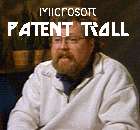

Slashdot is a weird beast. I recently re-subscribed just to get a taste of where it's at after doing all the Microsoft PR [1, 2, 3, 4] (there is a bit less of that now). When it comes to patent news, Slashdot used to be good a decade ago, but recently it became a platform for grooming villains, aiding some ill patent agenda [1, 2]. It is not as though software patents are promoted, but sometimes it seems like trolls are. How truly baffling.
Patent Court Stands By Its Claim That Adding 'On The Internet' Can Make An Abstract Idea Patentable
We've been following the Ultramercial case quite closely over the past few years. If you're not aware, this involved a company that more or less patented the idea of "you must watch this ad to get this content" (US Patent 7,346,545) and then sued pretty much everyone. Most of the companies it sued settled rather than fight (which happens all the time), including YouTube and Hulu, but one company, WildTangent, has continued the fight. Eventually, though, the case reached the Supreme Court with the key question being does taking an abstract idea like "watch this before getting that" and adding "on the internet" to it make it patentable? It's well established that you can't patent an abstract idea, but for some reason many seem to think that if you say "on the internet" it's no longer abstract. The Supreme Court did not do a full hearing on the case, but asked the appeals court of the federal circuit (CAFC -- known as the patent appeals court) to reconsider its original ruling in light of the Supreme Court's ruling in the Prometheus case, where it said that you can't patent broad medical diagnostics. The rule there was that you "could not simply recite a law of nature and then add the instruction 'apply the law.'" So, is the same true for "abstract idea" plus "on the internet"?
Now that we know that the FTC is interested in whether patent trolls' business practices are hurting competition and is planning to investigate, I thought I'd point out something I found interesting in a recent motion for a protective order [PDF] by Intellectual Ventures' CEO Nathan Myhrvold in a dispute with Lodsys, the patent troll trying to sue multiple companies and Apple app developers in two of the Lodsys litigations in Texas, Lodsys v. Brother International Corp. et al. and Lodsys v. Combay, Inc., et al.. The dispute is being handled separately, as Myhrvold v. Lodsys Inc et al, in Washington State, docketed as 2:13-mc-00088-RSL. The presiding judge is Robert S. Lasnik, hence the RSL in the docket line.
Myhrvold's lawyer has filed a Declaration in Support, as well some exhibits [PDF], one of them under seal. Myhrvold's trying to avoid a deposition by Lodsys, and the battle over it has been going on since last October.
From these documents, I learned that the patents Lodsys is using to sue everyone did indeed come from Intellectual Ventures, as we had heard, but there was a middle man, fellow patent troll Webvention LLC. This isn't the first time we've seen Webvention in the news going after multiple victims with goofy, broad-stroke patents it got from IV. Anyway, IV sold the patents Lodsys is using to Webvention first, and Webvention then sold them to Lodsys. Lodsys has some questions it would like Myhrvold to answer about all that.
He also allegedly had some conversations with Bill Gates that they'd like to ask him about, and there is an email to Gates and others at Microsoft dealing with "combinations" that they say came from Myhrvold's email account that they are interested in asking him about. Finally, there is an IV license with Microsoft that Lodsys would like more information about.
Me, too, and I hope the FTC will feel the same. A subpoena from the FTC would be harder to avoid complying with than one from Lodsys.